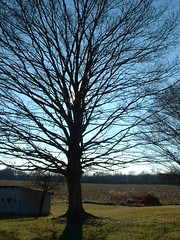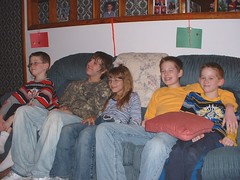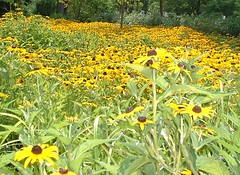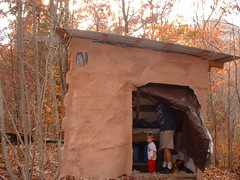Saturday, December 31, 2005
Good night
and to all my friends, old and new.
May we wake in the morning to find
a more peaceful and just world
and the strength to make it so.
Dan
Tuesday, December 27, 2005
Clarence Jordan, Part I
I quoted from Clarence Jordan's Cotton Patch Gospel in a previous post and folk asked about Clarence [last name pronounced, "jer' dan"]. Clarence and his wife, Florence, have a most interesting and uplifting story (with some small connections to our humble little church here in Louisville) and he is considered a saint by those of us so inclined. I've borrowed bits of a story by Joyce Hollyday to fill you in.
Enjoy and be inspired.
From an excellent story in:
© Sojourners, December 1979, Vol 8, no 12
by Joyce Hollyday
Florence and Clarence Jordan met at Southern Baptist Seminary in 1933, where he was a student and she the assistant librarian. When they began to consider marriage, Clarence said to her, "If you want to be the wife of a pastor of a First Baptist Church, you don't want to marry me." And he shared with her his plans to go back to the deep South, which was his home, to use his undergraduate agricultural training and "do something for the poor."
Clarence and Martin England, a former American Baptist missionary, found 440 acres of land in Sumter County, near Americus Georgia. Beginning to formulate a vision for a Christian farming community that could be a resource for the rural poor, Clarence and the England family moved there in the fall of 1942. The Jordans' first son was born in September, so Florence stayed with her parents in Louisville and then with Clarence's parents until April, 1943, when the house that Clarence and Martin were building was, in Florence's words, "at least campable."
Florence remembers that the switch from big-city living to "days of cooking on a wood stove, washing in the old iron pot, and carrying water were not easy. The land was a rather desolate-looking place, with some sagging barns, outbuildings, and sheds, one large, unpainted house , and two rundown tenant houses. But we were young and it was an adventure wit the Lord."
They called this adventure Koinonia, from the Greek word which was used to identify the early church in Acts, which pooled its resources and shared the life of Jesus Christ in an atmosphere of reconciliation. This was the model for the fledgling farm. The particular reconciliation that was so desperately needed at this time and place was between black and white. The Koinonians hired a black man, a former sharecropper, to help with the farm. They all ate their meals together, and this breach of Southern tradition brought on the first hostility toward the community.
In a story that has been told many times, Clarence showed the courage and quick wit that became his trademark. A group of men came to the farm. Their spokesman said to Clarence, "We're from the Ku Klux Klan and we don't allow the sun to set on people who eat with niggers."
Clarence glanced over at the western sky and noticed that the sun was creeping low. He thought a bit, swallowed a few times, and suddenly reached out, grabbed the man's hand, and started pumping away, saying , "Why, I just graduated from Southern Baptist Seminary, and they told us there about folks who had power over the sun, but I never hoped to meet one here in Sumter County." They all laughed, and nobody noticed that the sun had slipped down below the horizon.
Despite the hostility of white neighbors, the farm soon became a success. Clarence invented a mobile peanut harvester and established a "cow library," through which poor neighbors could check out a cow for a period of time so that they could have milk. He built a deluxe chicken house that was the envy of the Koinonia wives, whose own houses were austere by comparison. The luxurious chicken quarters were the target of many jokes from the neighbors, but when Clarence began getting more eggs than anybody else, those same neighbors were soon asking him for advice.
Meanwhile, Clarence's reputation as a powerful, uncompromising preacher was growing. As he traveled the country preaching pacifism, social justice, and community, he drew young people to the experiment at Koinonia.
Florence remembers that people who came to visit the farm were always surprised to meet Clarence. They always expected to see an "older, intellectual-type person," rather than this large man who had earned his doctorate when he was 26 years old.
A distinguished professor once came to the farm while Clarence was working on a tractor. The man said, "I wish to speak to Dr. Jordan." Clarence wiped off a greasy hand, extended it, and said, "I am he." The man responded, "No, I wish to speak to Dr. Clarence Jordan." Clarence insisted that he was the one the man was looking for. After repeating his request, the professor finally got in his car and left. A few days later Clarence received a letter from the man, expressing that he was infuriated with the impudent help that Dr. Jordan managed to keep around.
Florence believes that Clarence "was one of those rare persons in whom dreams and practicality came together. He could do everything. He was not only a good farmer, he was a mechanic and an intellectual; he could lay bricks and do electrical work, whatever needed to be done. And he was as good in the kitchen and with the children as I was."
Some of the people who came to visit on the farm stayed. By 1950 the community included 14 adults. They embarked on year of struggle, marked by tension, mixed expectations, and disillusionment. Things moved slowly, every decision was labored, and community living was difficult. The infant community was beginning its arduous growth into tumultuous youth.
Clarence Jordan, Part II
In August, the small Rehoboth Baptist Church, where Florence had taught Sunday school and Clarence had led the singing and preached occasionally in the previous eight years, made a move to withdraw fellowship from the Koinonian's because of their racial view.
Florence faced the congregation alone while the others were out of town. She sat quietly in the pew as the recommendation to reject them was read. There was a tense pause. Then Florence got to her feet and moved that the recommendation be accepted as read. The congregation responded with stunned silence, supporting the motion, but unwilling to side with Florence. The Koinonians were eventually excommunicated, but Florence had shown the rare courage that was part of Koinonia from the beginning...
Clarence's aid to two black students in their application to a formerly segregated college in Atlanta was the spark that ignited the hostility. It began with threatening phone calls, grew to vandalism, and finally escalated into life-threatening violence.
Fences were cut, crops stolen from the fields, and garbage dumped on the property. A truck's engine was ruined by sugar placed in its gas tank, and nearly 300 fruit trees were chopped to the ground.
The children faced hostility and abuse in school, and the Jordan family was finally forced to send 14-year old Jim Jordan away to private school.
The farm's roadside market was bombed several times and eventually destroyed. Nightriders sprayed machine-gun bullets at the houses. Fires were set on the property, and crosses were burned on the lawns of black friends.
Several members of the community were called before a grand jury in the spring of 1957, the outcome of which was a report accusing Koinonia of maintaining Communist ties and of self-inflicting the violence for attention and profit. The community was asked to leave the county.
The violence forced the community members to ask difficult questions...
"Sometimes there was shooting two and three times a week, and we knew there was a chance that somebody might be killed...But we said, 'Well, that's okay too. We're not the first Christians who will have died for what we believe, and we won't be the last.'"
"The strange thing was that once we had made that decision, that it really didn't matter whether we lived or died because as Christians we're bought with a price, we're not our own, there was a peace. I think that is what Jesus meant when he said, 'I give you the peace that passes understanding.' It's the kind of thing that all Christians ought to face. But I'm glad they don't have to. But it did do something for us, and so we survived. And no one was seriously injured."
Sumter County residents bolstered their attack with the weapon of economics, hoping to choke the farm's livelihood, since they seemed unable to scare the Koinonians away.
"They formed a real solid boycott. One businessman told us that he was forced to sign at the point of a gun not to sell to us. We couldn't buy gas, fertilizer, or feed. We couldn't sell an egg. For about a year there we didn't make a living. If it had not been for our friends, who voluntarily gave to us, we couldn't have done it."
It was necessity that forced the community into the mail-order pecan business during the boycott. The mail and the open pecan market were two things the local people could not control...
Clarence's plan was a way for the rich to share their resources and for the poor to find new hope and security in their lives. His idea was that the farmers would work together as partners, providing for one another and returning any excess back to the fund so that more land could be purchased for others.
The idea of partnership was carried out in the farming, the pecan industry, and in housing. With Clarence and Millard [Fuller, founder of Habitat for Humanity, which sprung from Koinonia. -dan] working together on the fund raising, money poured in from friends and churches. By this time the farm covered 1,400 acres. Plots of land were sold to area residents at whatever price they could pay. By 1969, the first house had been built. Koinonia Partners was in business.
Clarence lived to see the first house almost completed. On October 29, 1969, at the age of 57, he died.
Millard was unable to convince the coroner or county medical examiner to come to the farm to pronounce Clarence dead: "Even in death, Clarence Jordan was rejected by the high and mighty, by those in authority, in the area in which he lived. But this was not surprising to me, as it never had been to him, because the Bible promises that a prophet is never with honor in his home area."
The medical examiner insisted that Millard rent an ambulance and bring Clarence's body to the hospital. But Millard felt that Clarence would have objected strongly to having money spent on a dead body. "So we loaded the body in the car...I smiled as I went through town with Clarence sitting down. I knew he would have gotten a terrific charge out of that."
======
I could go on and on, he's such an interesting character and Koinonia's story is so fascinating, but that's enought to whet your appetite. Feel free to read his own writings, or more about his story. For more info about Koinonia Farms and the Jordan's, visit:
Friday, December 23, 2005
Merry Christmas, Happy Holy Days!
"You’ve also heard the saying, ‘Take an eye for an eye; take a tooth for a tooth.’ But I’m telling you, never respond with evil. Instead, if somebody slaps you on your right cheek, offer him the other one too. And if anybody wants to drag you into court and take away your shirt, let him have your undershirt. If somebody makes you go a mile for him, go two miles. Give to him who asks of you, and don’t turn your back on anyone who wants a loan.
"Another thing you’ve always heard is, ‘Love your own group and hate the hostile outsider,’ But I’m telling you, love the outsiders and pray for those who try to do you in, so that you might be sons of your spiritual Father...
"Therefore, let me tell you all something: Don’t worry about making a living—what you’ll eat, what you’ll drink, what you’ll wear. Isn’t the life of a man more important than what he eats? Think for a moment about the birds of the sky. They don’t plant. They don’t harvest. They don’t store up in barns. Even so, your spiritual Father cares for them. Really now, aren’t you all more precious than birds? Besides, who of you, by fretting and fuming, can make himself one inch taller?
"And what’s all this big to-do over clothing? Look yonder at that field of flowers, how they’re growing. They do no housework and no sewing. But I’m telling you, not even Solomon in all his finery was ever dressed up like one of them. Well then, if God so clothes the flowers of the field, which are blooming today and are used for kindling tomorrow, won’t he do even more for you, you spiritual runts?... Don’t worry over the future; let the future worry over itself. Each day has enough trouble of its own...
"Keep your eye peeled for fake preachers, who come to you with sheepskins from wolf-schools. You’ll be able to distinguish them by the way they live. You know, you don’t gather pecans from a persimmon tree nor peaches from a chinaberry, do you?... Any tree that does not produce cultivated fruit is chopped down and thrown into the fire. That’s why I told you that you could know them by the way they live.
"Not everyone who glibly calls me ‘Lord, Lord,’ shall enter the God Movement, but he who does the will of my spiritual [Mother]. The time will come when many people will gather around and say, ‘L-o-ord, oh L-o-o-rd, we sure did preach in your name, didn’t we? And in your name we gave the devil a run for his money, didn’t we? We did all kinds of stunts in your name, didn’t we?’ Then I’ll admit right in front of everybody, ‘I’ve never known you. Get away from me, you wicked religious racketeers!'"
When Jesus finished speaking, the people were simply amazed at his ideas, for he was teaching them like he knew what he was talking about. He didn’t sound like their preachers.
======
Happy Birthday, Jesus. Thanks for the Great Gift.
Wednesday, December 21, 2005
Literary Gifts
To that end, young Brandon over at A Book of Voices has started a new blog for book talkin':
Lit Nerd Central
http://litnerdcentral.blogspot.com/
Check it out, it's just starting, but I'm sure it will grow and be a great place at which to waste even more of your precious time.
Monday, December 19, 2005
Okay, okay
A. Seven things to do before I die
B. Seven things I cannot do
C. Seven things that attract me to (...)
D. Seven things I say most often
E. Seven books (or series) that I love
F. Seven movies I watch over and over again (or would if I had time)
G. Seven people I want to join in, too.
A. Before I die...
1. Do a complete one of these list things...
2. Hike the Appalachian Trail
3. Hike Muir's Journey to the Gulf
4. Canoe across Kentucky (downstream, mostly)
B. Can't do...
1. Do a complete one of these list things...
C. That attract me...
D. Say most often...
1. I don't do these list things unless they're short and intrigue me...
E. Books
[On THIS one, I'll bite...but 7 is really unfair:]
1. Wendell Berry essays
2. Wendell Berry fiction (it's a toss up on which is my favorite, don't ask. Just read.)
3. Those who came before Berry (or his contemporaries)
a. Thoreau
b. Gene Logsdon
c. Aldo Leopold
d. Harlan Hubbard (author of "A Payne Hollow Journal")
e. Edward Abbey
f. Barbara Kingsolver
g. David Orr
4. Mary Shelley's Frankenstein
5. The Bible
6. Mark Twain, Mark Twain, Mark Twain!
7. Art Gish ("Living in Christian Community," "Beyond the Rat Race")
8. (sorry) Tolkien
F. Movies...
1. The Mission
2. A River Runs Through It
3. Monty Python and the Holy Grail
4. Marx Brothers
5. Dead Poets Society
6. Harvey
7. True Grit (sorry, I just love this rascally ol' John Wayne flick. Go figure!)
G. Who I'll invite?
Anyone who'd like to answer any or all of these questions, feel free to.
Thanks, Koby
Monday, December 12, 2005
US Poverty...
Myth 1. Welfare increases poverty.
Before our modern welfare state, the US suffered a great deal under the ill-effects of what I would call poverty. A history of welfare in America is also its history of poverty: the more, the less. Rather than repeat what has been written elsewhere, I'll refer you to a link on this topic.
http://www.huppi.com/kangaroo/L-welfarepoverty.htm
Myth 2. Social workers, mental health advocates and other helper agencies are wimpy enablers.
In fact, the role of social workers is to enable people to be as self-sufficient as they possibly can be. In order to do this, they help set strict parameters for getting out of negative habits. Doesn't always work and, sure, there may be some "helpers"out there that end up enabling, but that only points to the need to improve a difficult job rather than end it.
Myth 3. It is wrong to take money from innocent wage-earners to fund what some think is a biblical imperative. [Okay, not actually a myth, but a mistaken notion.]
Taxation, in our context, is exactly the process of taking money from innocent wage-earners to fund what a majority of representatives deem responsible (or, more cynically, what a majority of representatives have been TOLD to vote for by their corporate masters). Those on the left and probably most on the right agree that taxes shouldn't be used to fund what some think is a biblical imperative. In fact, it is usually those on the right who tend to try to do this. To suggest that I'm suggesting this is a misrepresentation of my position.
[And when it comes to taking money from wage-earners, I would like to point out that there is a MUCH greater amount of money taken from innocent us to fund the military than assistance programs. So, it is not the notion of spending money that Conservatives have a problem with - they do that more than anyone, with the assistance of the Democrats usually.]
But back to the topic: Those on the left tend to believe that, while an individual or group may have a biblical foundation for what they believe, that we should only push as government policy what we can make a logical argument for (not a biblical one).
So, while I have a biblical foundation for what I believe about assistance for the poor, for instance, that is not part of my civic reasoning for policy-making. Instead, in the case of poverty (or, assisting those struggling in the US, if you don't like the term "poverty"), I would argue that it is fiscally responsible (a conservative notion?) to invest in good education, assisting people out of poverty, keeping families together where reasonably possible (at a cost of $x) instead of paying down the road to house prisoners, to deal with the ill-effects of poverty, to deal with drug abuse, to decrease abortion (at a cost of $2x).
I'll own up that I don't know the numbers off the top of my head. The above-linked article delves in to this topic somewhat. If it is debatable to you whether it is cheaper to deal with poverty later rather than earlier, then we can get to the specifics of What costs How Much...
Repond, s'il vous plait.
Sunday, December 11, 2005
Snowy Lampposts
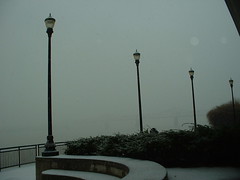
Snowy Lampposts
Originally uploaded by paynehollow.
Does anyone know how to take good snowy day pictures? This was a beautiful, misty whiteout sort of snow and I took several shots in various settings but couldn't get a decent one.
Friday, December 9, 2005
The Bible, Wealth and Poverty, Part I
Are you familiar with the story of Josiah, the boy king? Found in 2 Kings, maybe elsewhere.
In his story, he goes about trying to setting the temple back a-right, after years of neglect. In the process, he finds the Lost Book of the Law - their scriptures. After reading it and realizing how far away Israel had wandered from God's teachings, young Josiah tore his clothes in despair.
I feel that way sometimes. That our scriptures have been Lost. Only this time, they weren't lost, hidden away in some secret cabinet in a neglected temple. They were lost by means of obfuscation.
Our churches have for years obcured and twisted the scriptures in to something that only bears a passing resemblance to the words therein. Hidden in plain sight.
I grew up in a Baptist church - people of the Bible, they call themselves. And rightly so. The Baptists really push personal study of the Bible, which is a grand thing and for which I'm grateful. But they also so thoroughly taught me what the Bible says, that it has been difficult for me to get beyond those teachings to what the Bible actually says.
I don't think it has always been deliberate or mean-spirited. Our teachings have been passed down this way probably much the way of that old party game where you get in a line and whisper something in the first person's ear and everyone passes it down and the message at the end is often amusingly distorted.
So it has been with some surprise to me that as I try to read the Bible with fresh eyes and an open heart, that I'm discovering the bible is chock full of economic issues.
Remember Mary's song she sang when she was expecting Jesus? Do you remember the line: "The Lord has brought down rulers from their thrones but has lifted up the humble. God has filled the hungry with good things but has sent the rich away empty." Interesting...
We all remember wild-eyed John the Baptist, dressed in his camelskin and eating bugs and calling for repentance. But do we recall WHY he called for repentance? Here's what John said:
"You brood of vipers! Who warned you to flee from the coming wrath? Produce fruit in keeping with repentance...
"What should we do then?" the crowd asked.
John answered, "The man with two tunics should share with him who has none, and the one who has food should do the same."
For John the Baptist, repentance was directly tied to economic justice. Solidarity with the poor.
When John asked Jesus who he was, remember Jesus' answer? "Tell John about the outcasts being healed and that I'm preaching good news to the poor." To the poor specifically!
Or how about when Jesus told the rich young man what he needed to do to be saved, remember? Was it to pray to God for forgiveness and "dedicate his life to Jesus"? No. Jesus told him to sell all he had and join in with his community. Sadly, the rich man left because, Jesus tells us, it is difficult for the rich to enter the kingdom of heaven!
And Jesus, when he began his ministry told us specifically what he was about, by saying:
God has sent me to bring good news to the poor, to proclaim liberty to captives, and to the blind new sight, to set the downtrodden free, to proclaim the Lord's year of favor.
Good news to the poor – specifically to the poor. Healthcare for the sick. Liberty to captives (and looking into this, one big reason folk were jailed was for economic reasons - "the man who could not pay his bills and was about to be thrown into jail," remember?). And Jesus came to proclaim the "Lord's Year of Favor," a reference, I'm told, to the Jubilee Laws of the Old Testament.
The Bible, Wealth and Poverty, Part Deux
So let's jump back to the OT for a minute: What are the Jubilee Laws?
The Jubilee Laws are found in Leviticus initially. They were a means of transferring land back to original owners every 50 years, of freeing indentured slaves every seven years, and of providing food for the poor, among other things. It was also a way of reminding the Israelis that, according to God, “The land must not be sold permanently, because the land is Mine and you are but aliens and My tenants.”
The Jubilee Laws were a way of keeping wealth and power from accumulating in the hands of a few and ensuring “enough” for everyone.
While it is not always obvious, once you know to look for it, you can see references to Jubilee sprinkled liberally throughout the Bible. As are words giving voice to God's concern for economic justice in general. As are God's words of warning and condemnation towards the rich.
Woe unto them that join house to house, that lay field to field, till there be no place, that they may be placed alone in the midst of the earth!
Isaiah 5
Is not this the kind of fasting I have chosen: to loose the chains of injustice and untie the cords of the yoke, to set the oppressed free and break every yoke? Is it not to share your food with the hungry and to provide the poor wanderer with shelter – when you see the naked, to clothe him, and not to turn away from your own flesh and blood?
Isaiah 58
As a cage is full of birds, so are their houses full of deceit: therefore they are become great and waxen rich....they overpass the deeds of the wicked: they judge not the cause, the cause of the fatherless, yet they prosper; and the right of the needy do they not judge. Shall I not visit for these things? saith the Lord: shall not my soul be avenged on such a nation as this?
Jeremiah 5
He that oppresses the poor reproaches his Maker.
Proverbs 14
For three transgressions of Israel and for four, I will not revoke the punishment; because they sell the righteous for silver, and the needy for a pair of sandals – They who trample the head of the poor into the dust of earth, and push the afflicted out of the way.
Amos 2
Now listen, you rich people, weep and wail because of the misery that is coming upon you. Your wealth has rotted, and moths have eaten your clothes. Your gold and silver are corroded. Their corrosion will testify against you and eat your flesh like fire. You have hoarded wealth in the last days.
James 5
Oh! And the “Sin of Sodom?” Well, we all know what that was, don't we? God spells it out for us in Ezekiel 16:
Now this was the sin of your sister Sodom: She and her daughters were arrogant, overfed and unconcerned; they did not help the poor and needy.
I could go on and on with biblical references, but I'll stop here. You get the drift. I'm telling you, it is quite surprising (at least for some of us brought up in churches where we learned the “Big Sins” were drinking, smoking, sex and cussing), to discover how omnipresent God's teachings on wealth and poverty are within the Bible. Front to back.
It is for this reason that I speak about economic issues so frequently in these sorts of conversations. I think the church has it largely wrong. We're focusing on minor issues and are often on the wrong side of God's teachings in the Bible.
Like Young Josiah, I'd like to see the Book of the Law to be rediscovered and reclaimed for what it actually says.
Thoughts?

